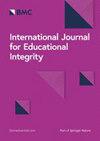了解研究生对抄袭的看法:以在新西兰的越南和本地学生为例
IF 6.9
Q1 EDUCATION & EDUCATIONAL RESEARCH
International Journal for Educational Integrity
Pub Date : 2022-02-01
DOI:10.1007/s40979-021-00098-2
引用次数: 9
摘要
尽管学术界对高等教育学生对抄袭的看法越来越感兴趣,但对研究生(PG)学生的看法却知之甚少,尽管本科生(UG)和研究生(PG)学生之间的差异与他们的特点和学习要求有关。此外,在国际教育背景下缺乏研究,管理剽窃被视为一项重大挑战。本文报告了最近对新西兰一所大学的207名越南(n = 72)和当地(n = 135)研究生进行的在线调查,调查内容是关于他们对抄袭的看法。研究结果显示了两组之间和两组内部的显著差异。认知上的差异源于一系列的影响和先前的经历,而不仅仅是学生最初所受教育的文化。差异与参与者的年龄、性别、学术水平、学科和教学经验有关。本研究的发现有助于了解研究不足的研究生,并对国际学生关于抄袭的普遍刻板印象提出问题。这对高等教育机构在满足国际和国内研究生需求的方式上产生了启示,即尊重他们作为个体的多样性,而不是作为同质群体的成员。建议进一步进行定性研究,以更深入地探讨研究生的看法。本文章由计算机程序翻译,如有差异,请以英文原文为准。
Understanding postgraduate students’ perceptions of plagiarism: a case study of Vietnamese and local students in New Zealand
Despite increasing scholarly interest in tertiary student perceptions of plagiarism, very little is known about those held by postgraduate (PG) students, although differences between undergraduate (UG) and PG students relate to both their characteristics and the demands of their studies. Furthermore, there is a dearth of research within the context of international education, where managing plagiarism is seen as a major challenge. This paper reports on a recent online survey with 207 Vietnamese (n = 72) and local (n = 135) PG students at a New Zealand university regarding their perceptions of plagiarism. The findings showed significant differences both between and within the two groups. Perception variations arose from a range of influences and prior experiences, not just the culture in which the students were initially educated. Differences related to participants’ age, gender, academic levels, disciplines, and teaching experience. This study’s findings contribute knowledge about under-researched PG students and problematize prevalent stereotypes of international students regarding plagiarism. They generate implications for higher education institutions to accommodate international and domestic PG student needs in ways that respect their diversities in detail as individuals, not as members of a homogeneous group. Further qualitative research to explore PG student perceptions in greater depth is recommended.
求助全文
通过发布文献求助,成功后即可免费获取论文全文。
去求助
来源期刊

International Journal for Educational Integrity
EDUCATION & EDUCATIONAL RESEARCH-
CiteScore
6.90
自引率
26.10%
发文量
25
审稿时长
22 weeks
 求助内容:
求助内容: 应助结果提醒方式:
应助结果提醒方式:


